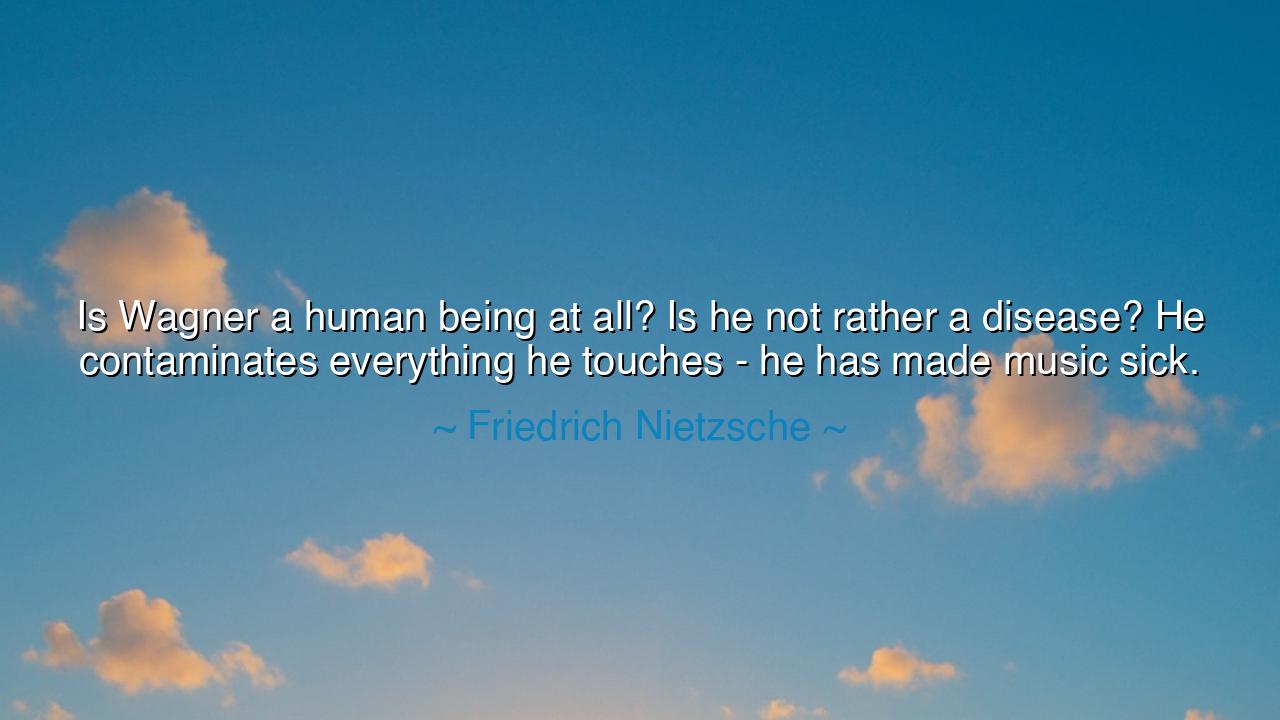
Is Wagner a human being at all? Is he not rather a disease? He
Is Wagner a human being at all? Is he not rather a disease? He contaminates everything he touches - he has made music sick.






Hear the burning words of Friedrich Nietzsche, philosopher of storms and fire, who declared: “Is Wagner a human being at all? Is he not rather a disease? He contaminates everything he touches—he has made music sick.” In this fierce judgment lies more than anger at a man; it is the cry of a prophet who saw art drifting from health into decadence. For Nietzsche believed that music, the most sacred of arts, ought to lift the spirit, strengthen the will, and nourish life itself. To him, the music of Richard Wagner, though mighty, carried the perfume of corruption—too heavy, too theatrical, too decadent—more intoxication than nourishment. Thus he spoke of disease, for what sickens the spirit, no matter how dazzling, cannot be called divine.
The ancients, too, knew the difference between what is vital and what is sickly. The Greeks sang of Apollo and Dionysus—order and ecstasy—two forces that in balance made art whole. But when ecstasy becomes frenzy without truth, when spectacle overwhelms clarity, the soul becomes drunk, not enlightened. This was Nietzsche’s warning: that Wagner’s music, though rich with thunder and brilliance, seduced the senses while starving the spirit. It was art that entertained but did not heal, that dazzled but did not strengthen. And so he called it a disease, for even beauty can carry poison when it forgets the higher purpose of life.
Consider the fall of Rome. In her last days, the people no longer hungered for virtue or discipline, but for bread and circuses. Gladiators in the arena spilled blood for spectacle, while emperors staged vast entertainments to distract the masses from decay. The people cheered, the theaters roared, but beneath the sound was sickness. Rome became like a body swollen with fever, entertained unto death. So too did Nietzsche see in Wagner’s art a parallel: the triumph of spectacle over spirit, the lure of grandeur masking a deeper decline.
Yet, we must not mistake Nietzsche’s words as mere hatred. Once, he loved Wagner, seeing him as a prophet of new art, a champion of the soul’s fire. But disillusionment struck, for Wagner’s music, in Nietzsche’s eyes, abandoned strength for sentiment, clarity for indulgence. This betrayal wounded him deeply, as when a disciple sees his master falter. His fury was not born of indifference, but of broken faith. He wished for art that would rouse men to courage, not lull them into dreamy intoxication. Thus, his condemnation is less about Wagner alone, and more about the eternal battle between art that heals and art that corrupts.
The teaching, then, is clear: weigh carefully what you consume, whether in music, in art, or in life. Not all that glitters is nourishment; not all that intoxicates is holy. Ask yourself: does this strengthen me? Does it sharpen my spirit, deepen my courage, enlarge my love of life? Or does it weaken me, dull my mind, seduce me into passivity? Nietzsche’s cry against Wagner is, at its heart, a call to vigilance: protect your soul from that which dazzles but diminishes.
From this springs practical wisdom: choose art, speech, and companions that make you more alive. Do not feast only on spectacle, but seek also that which challenges and uplifts. Read words that awaken thought, listen to music that stirs your heart without chaining it, surround yourself with voices that bring clarity instead of confusion. For as the body sickens from poisoned food, so too does the soul sicken from poisoned beauty. To live well, one must discern what is healing from what is merely pleasing.
So let Nietzsche’s thunderous words echo across the ages: guard the temple of your spirit. Do not be deceived by grandeur alone, nor by beauty that hides rot. Seek always the art, the truth, the life that nourishes strength. For only in this way will you walk as one who is alive, whole, and uncorrupted. Let the lesson be this: better the humble song that heals, than the grand symphony that sickens. Choose the healthy flame, and reject the dazzling fire that devours.






AAdministratorAdministrator
Welcome, honored guests. Please leave a comment, we will respond soon